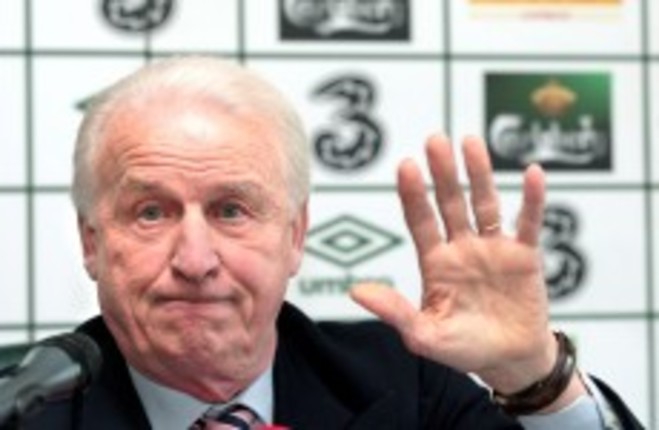WITH EURO 2012 excitement set to reach fever pitch, we’ve decided to look back on Trap’s tenure as Ireland boss and highlight those key moments that – for better or worse – have defined his tenure.
So here they are, in chronological order:
Ireland 1-1 Bulgaria (March 28, 2009)
The game was one of the first instances where Trap’s overtly negative style of football didn’t pay dividends. The home side took an early lead courtesy of a Richard Dunne header, and whereas Irish teams of the past, with a buoyant home crowd behind them, would have continued to attack and attempt to add to their lead, Trap’s Ireland sat back and gave Bulgaria the initiative. The hosts thus enabled their opponents to establish control of the game, resulting in a period of sustained pressure, which subsequently led to a Kevin Kilbane own goal. Therefore, more than any other game, Ireland were left to rue a lack of ambition against a less-than-impressive Bulgaria side, which ultimately was a major factor in their failure to qualify automatically from the group.
YouTube credit: BGfutbol
Italy 1-1 Ireland (April 1, 2009)
The game was the polar opposite to the Bulgaria match in many ways. Ireland started poorly, but the concession of an early goal and the fact that the Italians had a player sent off early on forced them to depart from their normal style and play a more attractive brand of football, with a greater emphasis on passing and attacking. They were eventually rewarded for their bold approach, in the form of a late Robbie Keane equaliser. Indeed, Keane spurned another chance to win it – a result that would not have flattered Ireland on the night.
YouTube credit:HQFootball
France 1-1 Ireland (AET) (November 18, 2009)
Like the aforementioned Italy game, this encounter showed that Ireland were capable of playing the type of football that the supporters wanted to see without losing any of their defensive discipline in the process. However, as in the previous case, Ireland seemingly only opted to play in this fashion when their backs were to the wall. Having lost an anti-climactic first-leg 1-0 to France, Trap’s side knew they had little to lose. Consequently, they produced arguably their best performance under the Italian so far, outplaying a French side that had seemingly underestimated their opponents. Ireland spurned some decent chances to win it, before the cruel hand of fate (almost literally) prompted their exit from the competition.
YouTube credit: xanopl
Ireland 2-3 Russia (October 9, 2010)
Only Trap’s second competitive loss as Ireland coach (France in the first leg of the playoff was the other), the game was somewhat of an anomaly in his stint as Ireland manager. Whereas the Italian’s sides are normally extremely disciplined and difficult to play against, Ireland simply fell apart against a technically superior Russian outfit in this instance. You could argue that Ireland had yet to come up against a team of Russia’s quality, but the concession of three first-half goals was surely as much to do with their uncharacteristically sloppy approach to the game.
YouTube credit: muenzer80
Russia 0-0 Ireland (September 6, 2011)
Even Trap admitted after this game that Ireland were lucky to escape Moscow with a point. And this relative success was hardly the result of a tactical masterstroke. Instead, it was the grit and determination of Ireland players (and particularly Richard Dunne) that ensured they avoided defeat. For 90 minutes, Russia set up camp in the Irish half, and yet somehow failed to score, leading to arguably Ireland’s most fortuitous result in recent memory.
YouTube credit: KristianComey
Ireland 2-1 Armenia (October 11, 2011)
If Ireland were desperately unlucky in the previous campaign under Trap, the same definitely cannot be said on this occasion. The referee sent off Armenia goalkeeper Roman Berezovsky in the 26th minute after he was adjudged to have hand-balled it outside his area. However, the officials failed to spot Simon Cox’s handball in the lead up to the incident, leaving the Armenians furious. Of course, credit must still go to Trap’s side, who beat an Armenia team that had shown a steady improvement during the qualifying campaign, which included a 4-0 win away to Slovakia.
YouTube credit: DkVanq
Estonia 0-4 Ireland (November 12, 2011)
The game that essentially assured Ireland’s qualification, and again, Trap’s side were helped by their opponents going down to ten (and subsequently nine) men. However, unlike in the Armenia fixture, they beat the Estonians in a thoroughly convincing manner. Quite why Ireland rarely perform with such verve against 11 men remains unanswered, nonetheless the fans, with Euro 2012 now in sight, weren’t complaining.
YouTube credit: TheTsportNews

